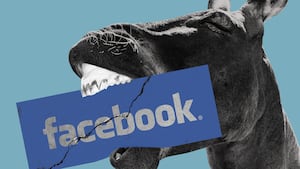It’s tempting to dismiss the behavior of Facebook executives detailed by the New York Times as juvenile hijinks. We can almost hear the sniggering as the young men of Silicon Valley swear to gray-haired senators to mend their ways, then keep doing just what they want to do. But Facebook is perhaps the most powerful communications corporation in history—and it’s now clear its executives will lie to Congress and worse.
That’s why it’s vital for the U.S. government to begin immediately to restructure the corporation. This is not a matter simply of replacing Mark Zuckerberg as CEO. Nor a matter only of adopting new national privacy rules, as Europe did earlier this year. What the government must do now is fundamentally alter how Facebook earns its money. The advertising-based revenue model must go.
A good guide for how to tame Facebook comes from America’s long experience with AT&T, the telephone corporation that dominated American communications during the 20th century. During these years Americans insisted that AT&T remain a neutral platform for communications and not try to make money through other lines of business, like running news services or selling the content of people’s phone conversations to marketers.
Like Facebook, AT&T started life as a purely private corporation, almost entirely unregulated by government. But between 1913 and 1982, both Democratic and Republican administrations repeatedly acted to ensure that AT&T served the public interest. They imposed rules limiting how much of the market AT&T could control, required the corporation to interconnect with rivals, capped the prices AT&T could charge customers, and capped the profits AT&T executives could pocket.
Regulators ordered AT&T to spin off its telegraph business, forced it to share out key patents, and prohibited the corporation from getting into the business of manufacturing computers. Crucially, the government banned AT&T from discriminating in any way between different users, such as charging different prices for the same service.
The American people, in other words, viewed AT&T as a public utility, and treated it as such.
Facebook, by contrast, has developed in a very different direction. In the almost complete absence of government oversight over the last 15 years, Facebook developed a business model based on the intimate surveillance of its users, the storage of massive caches of data on every individual, the use of that information to manipulate users to buy certain products or read certain articles or postings, and the renting out of these capabilities to anyone with the money to pay Facebook’s advertising fees, including foreign actors eager to disrupt America’s democracy.
And that’s only part of the problem. As the Open Markets Institute’s work has made clear, Facebook’s business model also puts the corporation into direct competition with newspaper and magazine publishers for advertising revenue. As Facebook has grown more powerful, it has diverted ever more of that money into its own pockets. One result is the loss of thousands of jobs for reporters and editors both in the United States and around the world. Facebook’s business model, in other words, has helped destroy the business model for non-fake journalism, helping to create the vacuum now being filled by rumors, lies, and hate speech.
In short, rather than serve the American people, Facebook manipulates the American people to serve its own private interests. And the model serves Facebook’s executives incredibly well. Last year, the corporation earned $40 billion from advertising—accounting for almost all of Facebook’s revenue.
The Facebook team has proposed some ideas for fixing itself. Last month they called for the United States to adopt European-style privacy regulation. Yesterday Zuckerberg spoke of creating a “supreme court” outside of Facebook’s direct corporate control to help police its content.
But Zuckerberg and the rest of his team have adamantly opposed any change to Facebook’s business model. When Apple CEO Tim Cook earlier this year criticized Facebook’s manipulation of its users, Zuckerberg called Cook’s comments “extremely glib.”
Facebook’s goal, Zuckerberg said, is to help “connect everyone in the world.” An “advertising-supported model,” he said, “is the only rational model.”
We agree that it matters how much a vital public service costs. But here too, the AT&T model proves Zuckerberg wrong. Under the direction of the U.S. government, AT&T executives developed a system almost universal in nature, one that served poor Americans almost as well as it served the rich.
More fundamental, it’s now clear that Facebook’s advertising-based business model is anything but cost-free. To use its service, we must share our most intimate secrets with strangers. And make ourselves subject to price and information discrimination. And cede fundamental decisions over what we read to a powerful corporation. And, as was made amply evident this week, trade away much of the cohesion of our society and the stability of our democracy.
No communications service is worth such a cost. The time to fix Facebook—or rather, Facebook’s business model—is now.







